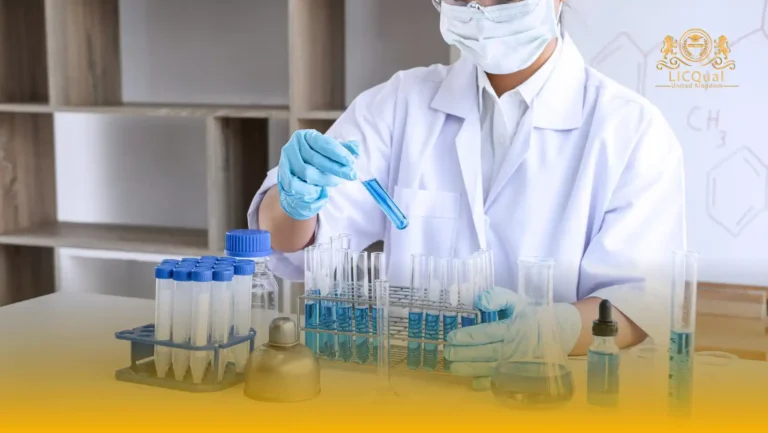The LICQual Level 3 Diploma in Pediatric Pharmacy (Dip Pediatric Pharmacy) is a specialized qualification designed for professionals who are eager to expand their knowledge, enhance their career prospects, and strengthen their Continuing Professional Development (CPD). With a focus on the unique requirements of pediatric care, this diploma equips learners with the skills and expertise needed to provide safe, effective, and evidence-based pharmaceutical care to children and young people.
This programme is structured to give learners a strong foundation in paediatric pharmacotherapy, clinical decision-making, and patient-centred care. It covers essential areas such as dosing considerations for children, the use of paediatric formulations, monitoring of therapies, and the pharmacist’s role in supporting the wellbeing of young patients. By completing this qualification, learners will gain valuable competencies that allow them to take on more advanced responsibilities within pharmacy practice and contribute positively to healthcare outcomes.
Centres delivering the LICQual Level 3 Diploma in Pediatric Pharmacy must meet strict quality standards to ensure successful delivery and learner achievement. This includes employing competent and qualified staff with the necessary academic and professional expertise, as well as providing all essential learning materials, resources, and support systems. These requirements ensure that learners are given the highest quality training experience, enabling them to achieve success and meet international professional expectations.
With its strong emphasis on CPD, professional growth, and practical application, this diploma is an excellent choice for learners committed to building a rewarding career in pediatric pharmacy and making a meaningful contribution to the healthcare of children and young people.
Course Overview
Qualification Title
LICQual Level 3 Diploma in Pediatric Pharmacy (Dip Pediatric Pharmacy)
Total Units
6
Total Credits
60
GLH
240
Qualification #
LICQ2201172
Qualification Specification
To enroll in the LICQual Level 3 Diploma in Pediatric Pharmacy (Dip Pediatric Pharmacy), applicants must meet the following criteria:
|
Qualification# |
Unit Title |
Credits |
GLH |
|---|---|---|---|
|
LICQ2201172-1 |
Principles of Pediatric Pharmacy Practice |
10 |
40 |
|
LICQ2201172-2 |
Pediatric Pharmacotherapy and Clinical Applications |
10 |
40 |
|
LICQ2201172-3 |
Formulations and Drug Delivery in Pediatrics |
10 |
40 |
|
LICQ2201172-4 |
Patient Safety, Ethics, and Governance in Pediatric Care |
10 |
40 |
|
LICQ2201172-5 |
Evidence-Based Practice and Clinical Decision-Making |
10 |
40 |
|
LICQ2201172-6 |
Professional Development and Continuing Practice in Paediatric Pharmacy |
10 |
40 |
By the end of this course, learners will be able to:
Unit 1: Principles of Pediatric Pharmacy Practice
By the end of this unit, learners will be able to:
- Explain the role and responsibilities of pharmacists in paediatric healthcare.
- Compare the physiological differences between children and adults and their impact on drug therapy.
- Identify key challenges in delivering effective paediatric pharmaceutical care.
- Apply fundamental principles of paediatric pharmacy practice to clinical scenarios.
Unit 2: Pediatric Pharmacotherapy and Clinical Applications
By the end of this unit, learners will be able to:
- Demonstrate knowledge of pharmacotherapy for common paediatric conditions.
- Apply correct dosing strategies based on age, weight, and developmental stage.
- Evaluate adverse drug reactions and monitoring requirements in paediatric patients.
- Integrate pharmacotherapy principles into patient-centred treatment plans.
Unit 3: Formulations and Drug Delivery in Pediatrics
By the end of this unit, learners will be able to:
- Describe different dosage forms and drug delivery systems suitable for paediatric patients.
- Assess the safety and stability of paediatric formulations.
- Explain the challenges of extemporaneous preparation and administration in children.
- Recommend appropriate drug delivery methods based on patient needs and clinical settings.
Unit 4: Patient Safety, Ethics, and Governance in Pediatric Care
By the end of this unit, learners will be able to:
- Apply safeguarding principles to ensure the safety of children receiving medicines.
- Analyse ethical considerations in paediatric prescribing and pharmacy practice.
- Demonstrate knowledge of governance frameworks relevant to paediatric healthcare.
- Evaluate strategies to reduce risks and medication errors in paediatric pharmacy.
Unit 5: Evidence-Based Practice and Clinical Decision-Making
By the end of this unit, learners will be able to:
- Critically appraise paediatric clinical guidelines and research evidence.
- Apply evidence-based practice to improve patient outcomes.
- Demonstrate effective clinical reasoning in complex paediatric cases.
- Integrate research findings into safe and effective pharmaceutical care.
Unit 6: Professional Development and Continuing Practice in Paediatric Pharmacy
By the end of this unit, learners will be able to:
- Develop and maintain a Continuing Professional Development (CPD) plan in paediatric pharmacy.
- Reflect on personal learning and professional growth in pharmacy practice.
- Demonstrate awareness of current trends and international standards in paediatric pharmacy.
- Apply professional values, ethics, and responsibilities in everyday practice.
The LICQual Level 3 Diploma in Pediatric Pharmacy (Dip Pediatric Pharmacy) is designed for learners who want to specialize in child‑focused medication management, pediatric care, and advanced pharmacy practice. This internationally accredited qualification is ideal for pharmacists, nurses, healthcare professionals, graduates, and policy makers who want to strengthen their expertise in pediatric pharmacy and improve patient safety. Whether you are starting your career or advancing into leadership roles, this diploma equips you with the skills, recognition, and confidence to succeed in the growing field of pediatric pharmacy.
1. Pharmacists and Pharmacy Technicians
- Pharmacists aiming to specialize in pediatric pharmacy and child healthcare
- Pharmacy technicians seeking accredited qualifications in pediatric medication management
- Professionals wanting to reduce risks in prescribing medicines for infants and children
- Staff preparing for roles in hospital pediatric clinics and community pharmacy services
- Learners interested in international standards for pediatric medication safety
2. Nurses and Clinical Healthcare Staff
- Nurses aiming to improve patient safety in pediatric care settings
- Clinical staff seeking practical skills in child medication adherence and monitoring
- Professionals wanting to strengthen knowledge of pediatric drug interactions
- Learners preparing for supervisory or quality assurance roles in pediatric clinics
- Staff aiming to contribute to safer healthcare delivery systems for children
3. Healthcare Professionals Focused on Child Care
- Doctors and practitioners specializing in pediatrics and child medicine
- Professionals seeking accredited qualifications in pediatric patient care
- Staff wanting to enhance evidence‑based practice in pediatric pharmacy
- Individuals aiming to expand career opportunities in hospitals and pediatric facilities
- Healthcare workers preparing for leadership roles in pediatric healthcare
4. Graduates in Life Sciences and Medicine
- Students with degrees in medicine, nursing, or pharmacy
- Fresh graduates seeking specialized training in pediatric pharmacy
- Learners aiming to boost employability with accredited qualifications
- Individuals preparing for careers in child healthcare and pharmacy practice
- Graduates interested in international healthcare and pharmaceutical pediatric standards
5. Pharmaceutical Industry Professionals
- Employees working in drug manufacturing and development for pediatric treatments
- Clinical trial coordinators seeking knowledge of pediatric medication protocols
- Staff aiming to strengthen compliance with global pediatric drug safety regulations
- Professionals preparing for leadership roles in pharmaceutical pediatric research
- Individuals wanting to integrate pediatric care into drug development processes
6. Policy Makers and Regulatory Authorities
- Professionals working in healthcare policy and regulation
- Staff involved in drug approval and compliance processes for pediatric care
- Individuals aiming to strengthen expertise in international pediatric pharmacy standards
- Learners preparing for advisory or consultancy roles in healthcare quality
- Policy makers seeking deeper knowledge of pediatric medication safety frameworks
7. Career Changers Entering Pediatric Pharmacy
- Professionals from other industries transitioning into healthcare and pharmacy
- Individuals seeking a structured pathway into pediatric medication management
- Learners aiming to gain practical, job‑ready skills quickly
- Career changers motivated by opportunities in child care and pharmacy practice
- Those wanting internationally recognized qualifications to boost employability
Centres intending to deliver the LICQual Level 3 Diploma in Pediatric Pharmacy (Dip Pediatric Pharmacy) must ensure that they meet the highest standards of quality, professionalism, and learner support. The following requirements are essential:
- Qualified and Competent Staff
- Centres must employ tutors, trainers, and assessors with relevant academic qualifications and professional expertise in pharmacy, particularly paediatric care.
- Staff should demonstrate experience in teaching, assessment, and clinical practice.
- Access to Learning Materials and Resources
- Centres must provide up-to-date study resources, including textbooks, research materials, and digital learning tools.
- Practical examples, clinical guidelines, and case studies should be accessible to enhance applied learning.
- Effective Assessment and Quality Assurance
- Robust assessment systems must be in place to ensure accuracy, fairness, and transparency.
- Internal quality assurance processes must be maintained to ensure consistency with LICQual standards.
- Learner Support and Guidance
- Centres must provide structured support through mentoring, feedback, and academic assistance.
- Policies promoting equality, diversity, and inclusion must be implemented to create an inclusive learning environment.
- Commitment to Continuing Professional Development (CPD)
- Teaching staff must actively engage in CPD to keep their knowledge and skills current.
- Course delivery should reflect best practices and international standards in paediatric pharmacy.
- Facilities and Infrastructure
- Centres must offer safe, accessible, and well-equipped facilities to support effective learning.
- Reliable IT systems and digital platforms should be available to facilitate blended and online learning options.
Assessment and Verification
All units within this qualification are subject to internal assessment by the approved centre and external verification by LICQual. The qualification follows a criterion-referenced assessment approach, ensuring that learners meet all specified learning outcomes.
To achieve a ‘Pass’ in any unit, learners must provide valid, sufficient, and authentic evidence demonstrating their attainment of all learning outcomes and compliance with the prescribed assessment criteria. The Assessor is responsible for evaluating the evidence and determining whether the learner has successfully met the required standards.
Assessors must maintain a clear and comprehensive audit trail, documenting the basis for their assessment decisions to ensure transparency, consistency, and compliance with quality assurance requirements.







